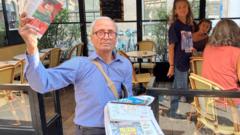**The story captures the spirit and challenges of Ali Akbar, the last newspaper vendor in France, highlighting both his historical significance and the changes in media consumption.**
**Last Newspaper Hawker in France Honored by President Macron**

**Last Newspaper Hawker in France Honored by President Macron**
**Ali Akbar, the beloved 72-year-old newspaper hawker, to receive the Order of Merit for his dedication to a fading tradition in Paris.**
With a career spanning over five decades, Ali Akbar, now 72, stands as an enduring symbol of traditional media in Paris, serving the Left Bank community with panache as France's last newspaper hawker. As he prepares to receive the Order of Merit from President Emmanuel Macron, a former customer, he reflects on a time when newspaper sales thrived.
In 1973, Akbar joined the ranks of over 35 hawkers in Paris. Today, he remains alone, facing the realities of a digital age where paper is rapidly losing ground. "When I began, I sold 80 copies within the first hour," he recalls. Now, with a few dozen sales during his rounds, his role has dramatically shifted. Akbar laments, "People just consult their phones instead."
Despite the decline in his trade, Akbar continues to embrace his role with joy. "I am free. There is no-one giving me orders. That's why I do it," he expresses, radiating the independence that his job affords him. His presence is deeply rooted in the community; many locals view him as a friend or a family member. "He knows everyone. And he is such fun," remarked one long-time patron.
Born in Rawalpindi, Pakistan, Akbar first arrived in Europe in the late '60s. After a journey filled with unique experiences, including working on a cruise liner, he found himself in Paris where he made a name for himself selling newspapers to students and celebrities alike. He fondly recalls his interactions with figures like Elton John and numerous politicians, including Macron, during his time at the prestigious Sciences-Po university.
However, the vibrancy of the Left Bank has waned in his eyes. "The atmosphere isn't the same," he reflects. Once alive with artists and intellectuals, he describes the area as now merely a "tourist-town." Yet, he faces these changes with humor, showcasing resilience in a rapidly transforming world.
As Akbar prepares to be honored, he stands not just as a final bastion of newspaper culture but also as a testament to the enduring spirit of community, reminiscence, and joy in one's work amidst a shifting landscape.
In 1973, Akbar joined the ranks of over 35 hawkers in Paris. Today, he remains alone, facing the realities of a digital age where paper is rapidly losing ground. "When I began, I sold 80 copies within the first hour," he recalls. Now, with a few dozen sales during his rounds, his role has dramatically shifted. Akbar laments, "People just consult their phones instead."
Despite the decline in his trade, Akbar continues to embrace his role with joy. "I am free. There is no-one giving me orders. That's why I do it," he expresses, radiating the independence that his job affords him. His presence is deeply rooted in the community; many locals view him as a friend or a family member. "He knows everyone. And he is such fun," remarked one long-time patron.
Born in Rawalpindi, Pakistan, Akbar first arrived in Europe in the late '60s. After a journey filled with unique experiences, including working on a cruise liner, he found himself in Paris where he made a name for himself selling newspapers to students and celebrities alike. He fondly recalls his interactions with figures like Elton John and numerous politicians, including Macron, during his time at the prestigious Sciences-Po university.
However, the vibrancy of the Left Bank has waned in his eyes. "The atmosphere isn't the same," he reflects. Once alive with artists and intellectuals, he describes the area as now merely a "tourist-town." Yet, he faces these changes with humor, showcasing resilience in a rapidly transforming world.
As Akbar prepares to be honored, he stands not just as a final bastion of newspaper culture but also as a testament to the enduring spirit of community, reminiscence, and joy in one's work amidst a shifting landscape.





















